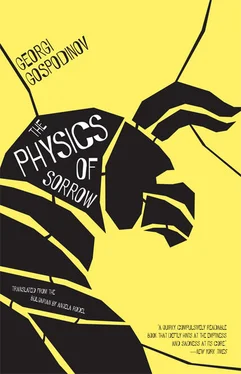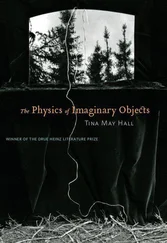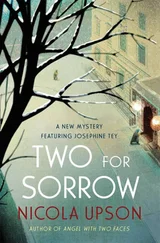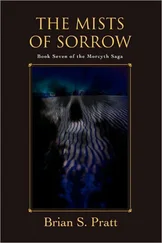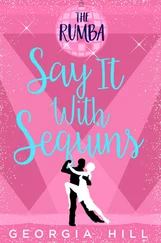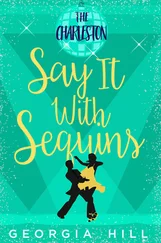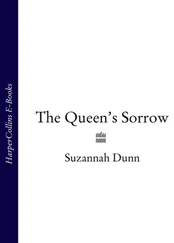If some invisible Vermeer is painting this picture and it is exhibited in the next century, pay attention to the dark spot in the lower right corner, right where the spoon fell. If you look at it long enough, like a Rorschach test, you’ll see the little devil of old age and his malicious grin.
SORROW MAKES BONES BRITTLE
I went to Finland mostly because of my father. I took advantage of a kindly invitation to a literary festival. I had had an intimate connection to this country since childhood, without ever having been there. My father had gone there by chance on his first and, as far as I know, only trip abroad back then. Finland, you might say, lived in our living room — six Finnish cups made from sturdy light-green glass, which we took out for guests. Setting them on the table always kick-started my father’s story. For us, it was like a fairytale, a Nordic saga, and an adventure novel all rolled into one. How they were each given only five dollars apiece, how they each illegally smuggled in a bottle of cognac or vodka, how afterward, with all the concomitant fear and shame, he had traded his bottle for the glasses we were drinking from, for the Finnish ashtray that was also sitting on the table, and for cloth for a dress for my mother. Here my mother would take the dress out of the wardrobe, bright and colorful, with big, withering roses, and everybody would click their tongues. Finland was the country of my childhood that came closest to that mythical country known as “Abroad.” The country of my father. Of fathers.
It just so happened that my visit to and initiation into Finland came about exactly thirty years later, right when I had become a father myself. And during the very same week when my father got the results of a “routine” test. At first, I decided to not go on the trip, but then it occurred to me that it was no coincidence that it had come about right at this moment, that it was fate, and that this trip would all but set some healing processes into motion.
I boarded the plane with an excess baggage of sorrow. It was the middle of June, the endless white nights. I was dwelling in some strange melancholy. It wasn’t the country I had imagined. It seemed to have aged since the time of my childhood. I was walking through the streets of Helsinki, but I wasn’t completely there. My daughter had just been born, and my father had just gotten a terrible diagnosis. When he had walked these streets, he had been twenty-five, I was already thirty-nine. I would never be able to match his eye for the world, I had already visited quite a few countries, the senses grow accustomed, the eye merely registers, the feeling of déjà vu builds.
And one night, my body gave out.
There is a lot of symbolism in breaking down in a country you have been inventing your whole life.
Past midnight, sometime around noon. It’s equally lightish-dark. In the dusk of the room I try to figure out what time of day it is and where my body is. I have no sense of either one. I feel light, hovering a few feet above the bed, nothing hurts, this is either heaven or. Those are either nurses or angels. They are speaking an unintelligible language — angelic or Finnish? I have no sense of a body, which would be wonderful if it were not slightly worrisome. With great effort I turn my head to the left and see the bag of liquid dripping into my arm. OK, got it, there are no IVs in heaven. My last memory is of riding the bike I had rented, mulling some things over, and suddenly there was a bright light ahead of me, turns out I was in the wrong lane, I swerved to get back into mine, then the sound of brakes, then. the room.
I slowly regain consciousness. The nurse on duty comes in from time to time with a syringe and a single English word, which is nevertheless sufficiently clear: “Painkiller!” She stops for a moment at the door, announces “Painkiller,” as if introducing some very important gentleman who will come in any second, forces the air out of the needle and plunges the syringe somewhere into my absent body. I try to explain in my broken English that nothing hurts. But she shakes her head and says something I don’t understand, in her Moomintroll-speak.
Sorrow makes bones brittle.
I have an almost cinematographic memory of being wheeled to the operating room. I’m lying on a moving stretcher and the long fluorescent lights above my head frame the empty shots of the film reel. I think to myself that if the stretcher were travelling at a speed of twenty-four frames per second, it would start some film rolling that is now invisible to me. The corridor is empty and echoes slightly. We pass through a floor that has a small café. A mother in a hospital gown and robe and three little girls, whom the father has clearly brought for a visit, are eating cake and drinking juice. I remember every movement in slow motion. I must look frightening, with my leg elevated, a slightly soaked bandage, an IV. The three little girls stop chattering, I hear the sounds of forks dropped onto plates as they innocently turn their heads in my direction as I pass by. I try to smile, the three little girls with pink shirts, straws, juice, their vague sympathy, mixed with curiosity and a bit of fear. The mother says something and the three of them immediately, albeit with displeasure, turn their heads away from the passing stretcher carrying some bandaged up thing. I hold this frame in my mind while the anesthesia overtakes me. You never know what your last vision before you cross over might be.
I open my eyes a crack and see the slightly blurry silhouette of Ritva, who immediately livens up when she notices I’m awake. She has stood by my bedside for hours. Once upon a time, back in distant 1968, she had been in Bulgaria for seven days. The best seven days of my life, she always says. I was twenty — young, leftist, and in love. Those three things never came together for me again, Ritva says. We must paint a strange picture for the doctors. A woman of sixty and an immobilized man of forty. The only thing we have in common is a year—1968. The year when she was happy is the year I was born. Without a visible connection between the two events.
What worries me most at the moment is a terrifying hypothesis. I can’t raise my head to look. So I try to move my leg. Nothing happens. I can’t feel anything from the waist down. Suddenly I imagine that the sheet there is empty. I feel myself falling back into that thick milky whiteness I had just swum out of. When I swim out of it again, it is because of a searing pain. My eyes jerk open. Ritva is again standing by me, I tell her it hurts, she calls Nurse Painkiller. I gradually realize that the pain is coming from my leg, so it must be there in its place and I can even move it. It hurts, thank God. It’s there and it hurts.
A week or two later, a cast-encased survivor, I’m lying at home, physically feeling the hours and minutes. I lie there throughout the summer of that year, serving it out like a prison sentence, without knowing for sure what crime I’ve committed. But that’s what all convicts say.
Triple fracture to the left ankle, two plates, seven pins, two cracked ribs, again on the left side. I stare at the ceiling for hours, the recumbent one’s only sky, and remember all the ceilings I’ve lain beneath. The high one in Berlin and the low one of my childhood. The constellations of flies on it. The bare light bulb wrapped in newspaper, that sole lampshade.
I recall the endless afternoons with which we were so generously endowed in that “once upon a time” of childhood, when I would again lie with my eyes open and stare up fixedly until the barely visible cracks and bumps in the ceiling started to change into strange mountains and seas upon which I set sail to distant lands. A few years later, the mountains and seas would magically transform into female hips, thighs, breasts, and curves. The more uneven and imperfect the surface, the more ships and women it hid.
Читать дальше
